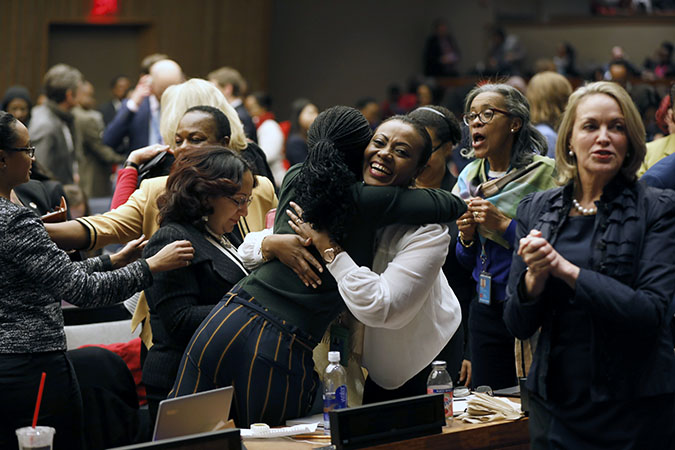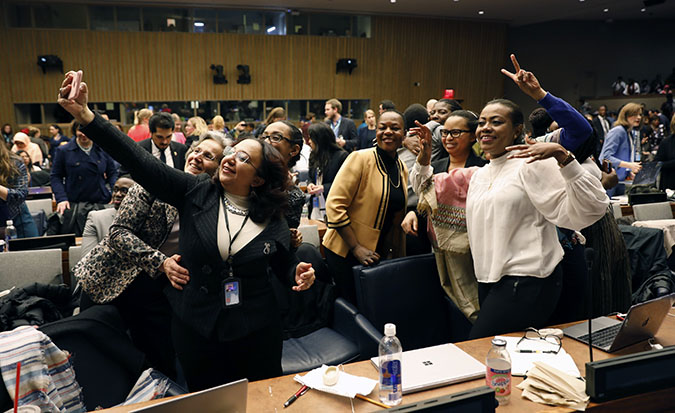Press release: UN Commission on the Status of Women delivers a blueprint to ensure the rights and development of rural women and girls
Food security and nutrition, land, water, food, work, and a life free of violence and without poverty highlighted as main issues to tackleDate:
Media Contacts:
Oisika Chakrabarti, Ph: +1 646 781-4522; Email: oisika.chakrabarti[at]unwomen.org
Sharon Grobeisen, Ph: +1 646 781-4753; Email: sharon.grobeisen[at]unwomen.org
Maria Sanchez, Ph: +1 646 781-4507, Email: maria.sanchez[at]unwomen.org
Zina Alam, Ph: +1 646-781-4783; Email: zina.alam[at]unwomen.org

(23 March, New York) - The UN’s largest annual gathering on gender equality and women’s rights concluded today in New York with the strong commitment by UN Member States to achieving gender equality and the empowerment of rural women and girls. Coming on the heels of unprecedented global activism and public outcry to end gender injustice and discrimination worldwide, the 62nd session of the UN Commission on the Status of Women (CSW) reached a robust agreement highlighting the urgency of empowering and supporting those who need it most and have, for too long, been left behind.
Today, 1.6 billion people still live in poverty, and nearly 80 per cent of the extreme poor live in rural areas. Many of them are rural women. They continue to be economically and socially disadvantaged – for instance, they have less access to economic resources and opportunities, quality education, health care, land, agricultural inputs and resources, infrastructure and technology, justice and social protection.
The outcome of the two-week meeting, known as the Agreed Conclusions adopted by Member States, puts forth concrete measures to lift rural women and girls out of poverty and to ensure their rights, well-being and resilience. These include ensuring their adequate living standards with equal access to land and productive assets, ending poverty, enhancing their food security and nutrition, decent work, infrastructure and technology, education and health, including their sexual and reproductive health and reproductive rights, and ending all forms of violence and harmful practices. Member States recognize in the conclusions rural women’s important role in addressing hunger and food insecurity. This strong outcome provides a roadmap on next steps that governments, civil society and women’s groups can undertake to support the realization of rural women’s rights and address their needs
The Executive Director of UN Women, which serves as the CSW Secretariat, Phumzile Mlambo-Ngcuka, said: “The Commission's agreement on measures to bring substantive equality to women and girls in rural areas is a vital step forward. In the Commission's two weeks of dialogue we have heard clearly from the women and girls themselves what they want: from the rights to own property, to the need for quality infrastructure, to the rights to make decisions about their own bodies and lives. Effective action to bring the changes they need will take the continued engagement of all partners, from governments to civil society. Rural women themselves must be able to speak up and be heard in all consultations, and youth delegations must be included at all levels. These agreements are made in the meeting rooms of New York but must take effect in the lives of women and girls we are here to serve."
CSW is the single largest forum for UN Member States, civil society organizations and other international actors to build consensus and commitment on policy actions on this issue. More than 4,300 representatives from over 600 civil society organizations, and 170 Member States attended this year’s Commission. These figures represent a steady increase from previous year’s participation showing a growing strength and unity of women’s voices around the world, and showcase the potential for civil society to leverage the agreed conclusions in their mission to hold governments accountable.

Member States expressed deep concern about the increasing challenges that are exacerbating the disadvantages and inequalities that rural women and girls face – from humanitarian emergencies and armed conflicts to the adverse impacts of climate change. In its final agreement, the Commission emphasized that rural women and girls are essential to sustainable development, and their rights and empowerment needs to be prioritized. A broad range of concrete next steps and recommendations were outlined in the Agreed Conclusions.
They include:
- Adoption of reforms to eliminate discriminatory laws and norms for women to have equal access to economic and productive resources, including land and natural resources, property and inheritance rights.
- Step up progress towards strong educational environments at all levels including closing gender gaps in secondary and tertiary education in rural areas.
- Provision of quality social services, and care services, to reduce the disproportionate share of unpaid care and domestic work of rural women and girls.
- Ensuring rural women have access to decent jobs with equal pay for work of equal value, and that they participate equally in all decisions, from households to community forums.
- Increasing essential rural infrastructure and technology, which typically reach rural women last, by providing access to, for instance, safe drinking water, a clean stove, sanitation facilities and connectivity.
- Stepping up investments to ensure their food security and nutrition and the increased financial inclusion and access to financial services of women farmers.
- Provision of universal health coverage, and realizing the need for women and girls in rural areas to manage and exercise their sexual and reproductive health.
- Accelerate action to end all forms of violence against women, including harmful practices such as child marriage and female genital mutilation
The Agreed Conclusions will be made available here shortly.